
cog
Containers for machine learning
Stars: 9231
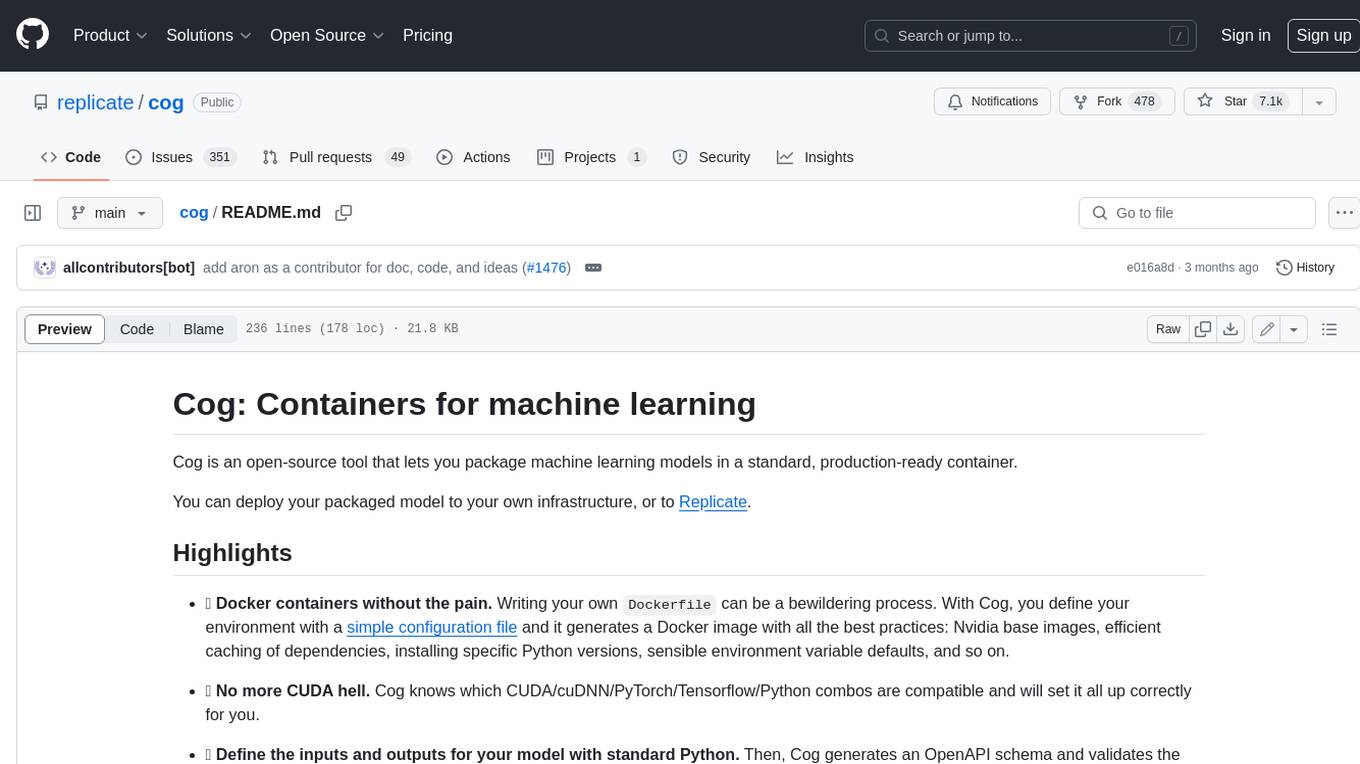
Cog is an open-source tool that lets you package machine learning models in a standard, production-ready container. You can deploy your packaged model to your own infrastructure, or to Replicate.
README:
Cog is an open-source tool that lets you package machine learning models in a standard, production-ready container.
You can deploy your packaged model to your own infrastructure, or to Replicate.
-
📦 Docker containers without the pain. Writing your own
Dockerfilecan be a bewildering process. With Cog, you define your environment with a simple configuration file and it generates a Docker image with all the best practices: Nvidia base images, efficient caching of dependencies, installing specific Python versions, sensible environment variable defaults, and so on. -
🤬️ No more CUDA hell. Cog knows which CUDA/cuDNN/PyTorch/Tensorflow/Python combos are compatible and will set it all up correctly for you.
-
✅ Define the inputs and outputs for your model with standard Python. Then, Cog generates an OpenAPI schema and validates the inputs and outputs.
-
🎁 Automatic HTTP prediction server: Your model's types are used to dynamically generate a RESTful HTTP API. Two runtime implementations available: FastAPI (default) and Rust/Axum (experimental, faster).
-
🥞 Automatic queue worker. Long-running deep learning models or batch processing is best architected with a queue. Cog models do this out of the box. Redis is currently supported, with more in the pipeline.
-
☁️ Cloud storage. Files can be read and written directly to Amazon S3 and Google Cloud Storage. (Coming soon.)
-
🚀 Ready for production. Deploy your model anywhere that Docker images run. Your own infrastructure, or Replicate.
Define the Docker environment your model runs in with cog.yaml:
build:
gpu: true
system_packages:
- "libgl1-mesa-glx"
- "libglib2.0-0"
python_version: "3.12"
python_packages:
- "torch==2.3"
predict: "predict.py:Predictor"Define how predictions are run on your model with predict.py:
from cog import BasePredictor, Input, Path
import torch
class Predictor(BasePredictor):
def setup(self):
"""Load the model into memory to make running multiple predictions efficient"""
self.model = torch.load("./weights.pth")
# The arguments and types the model takes as input
def predict(self,
image: Path = Input(description="Grayscale input image")
) -> Path:
"""Run a single prediction on the model"""
processed_image = preprocess(image)
output = self.model(processed_image)
return postprocess(output)In the above we accept a path to the image as an input, and return a path to our transformed image after running it through our model.
Now, you can run predictions on this model:
$ cog predict -i [email protected]
--> Building Docker image...
--> Running Prediction...
--> Output written to output.jpgOr, build a Docker image for deployment:
$ cog build -t my-colorization-model
--> Building Docker image...
--> Built my-colorization-model:latest
$ docker run -d -p 5000:5000 --gpus all my-colorization-model
$ curl http://localhost:5000/predictions -X POST \
-H 'Content-Type: application/json' \
-d '{"input": {"image": "https://.../input.jpg"}}'Or, combine build and run via the serve command:
$ cog serve -p 8080
$ curl http://localhost:8080/predictions -X POST \
-H 'Content-Type: application/json' \
-d '{"input": {"image": "https://.../input.jpg"}}'It's really hard for researchers to ship machine learning models to production.
Part of the solution is Docker, but it is so complex to get it to work: Dockerfiles, pre-/post-processing, Flask servers, CUDA versions. More often than not the researcher has to sit down with an engineer to get the damn thing deployed.
Andreas and Ben created Cog. Andreas used to work at Spotify, where he built tools for building and deploying ML models with Docker. Ben worked at Docker, where he created Docker Compose.
We realized that, in addition to Spotify, other companies were also using Docker to build and deploy machine learning models. Uber and others have built similar systems. So, we're making an open source version so other people can do this too.
Hit us up if you're interested in using it or want to collaborate with us. We're on Discord or email us at [email protected].
- macOS, Linux or Windows 11. Cog works on macOS, Linux and Windows 11 with WSL 2
- Docker. Cog uses Docker to create a container for your model. You'll need to install Docker before you can run Cog. If you install Docker Engine instead of Docker Desktop, you will need to install Buildx as well.
If you're using macOS, you can install Cog using Homebrew:
brew install cogYou can also download and install the latest release using our install script:
# bash, zsh, and other shells
sh <(curl -fsSL https://cog.run/install.sh)
# fish shell
sh (curl -fsSL https://cog.run/install.sh | psub)
# download with wget and run in a separate command
wget -qO- https://cog.run/install.sh
sh ./install.shYou can manually install the latest release of Cog directly from GitHub by running the following commands in a terminal:
sudo curl -o /usr/local/bin/cog -L "https://github.com/replicate/cog/releases/latest/download/cog_$(uname -s)_$(uname -m)"
sudo chmod +x /usr/local/bin/cogAlternatively, you can build Cog from source and install it with these commands:
make
sudo make installOr if you are on docker:
RUN sh -c "INSTALL_DIR=\"/usr/local/bin\" SUDO=\"\" $(curl -fsSL https://cog.run/install.sh)"
If you're using macOS and you previously installed Cog with Homebrew, run the following:
brew upgrade cogOtherwise, you can upgrade to the latest version by running the same commands you used to install it.
- Get started with an example model
- Get started with your own model
- Using Cog with notebooks
- Using Cog with Windows 11
- Take a look at some examples of using Cog
- Deploy models with Cog
-
cog.yamlreference to learn how to define your model's environment -
Prediction interface reference to learn how the
Predictorinterface works - Training interface reference to learn how to add a fine-tuning API to your model
- HTTP API reference to learn how to use the HTTP API that models serve
Thanks goes to these wonderful people (emoji key):
This project follows the all-contributors specification. Contributions of any kind welcome!
For Tasks:
Click tags to check more tools for each tasksFor Jobs:
Alternative AI tools for cog
Similar Open Source Tools

cog
Cog is an open-source tool that lets you package machine learning models in a standard, production-ready container. You can deploy your packaged model to your own infrastructure, or to Replicate.

ebook2audiobook
ebook2audiobook is a CPU/GPU converter tool that converts eBooks to audiobooks with chapters and metadata using tools like Calibre, ffmpeg, XTTSv2, and Fairseq. It supports voice cloning and a wide range of languages. The tool is designed to run on 4GB RAM and provides a new v2.0 Web GUI interface for user-friendly interaction. Users can convert eBooks to text format, split eBooks into chapters, and utilize high-quality text-to-speech functionalities. Supported languages include Arabic, Chinese, English, French, German, Hindi, and many more. The tool can be used for legal, non-DRM eBooks only and should be used responsibly in compliance with applicable laws.
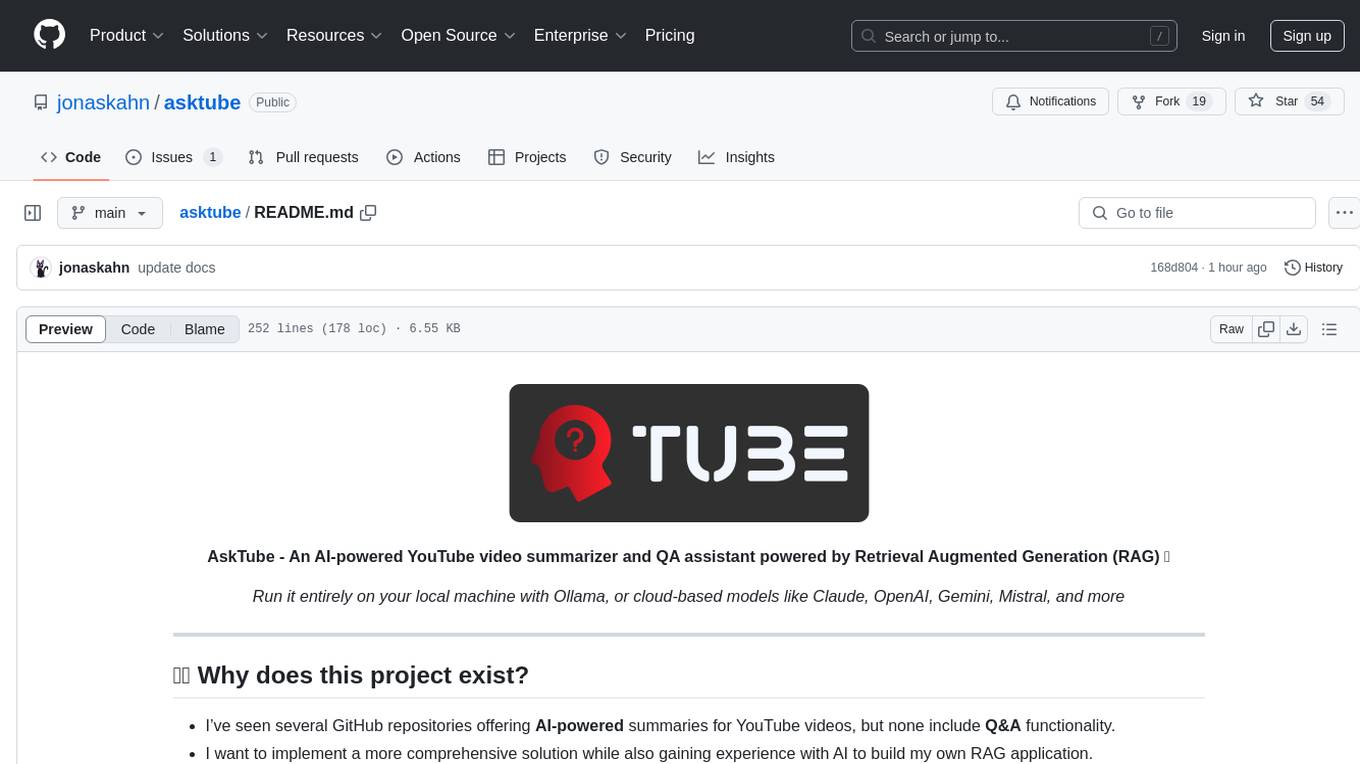
asktube
AskTube is an AI-powered YouTube video summarizer and QA assistant that utilizes Retrieval Augmented Generation (RAG) technology. It offers a comprehensive solution with Q&A functionality and aims to provide a user-friendly experience for local machine usage. The project integrates various technologies including Python, JS, Sanic, Peewee, Pytubefix, Sentence Transformers, Sqlite, Chroma, and NuxtJs/DaisyUI. AskTube supports multiple providers for analysis, AI services, and speech-to-text conversion. The tool is designed to extract data from YouTube URLs, store embedding chapter subtitles, and facilitate interactive Q&A sessions with enriched questions. It is not intended for production use but rather for end-users on their local machines.
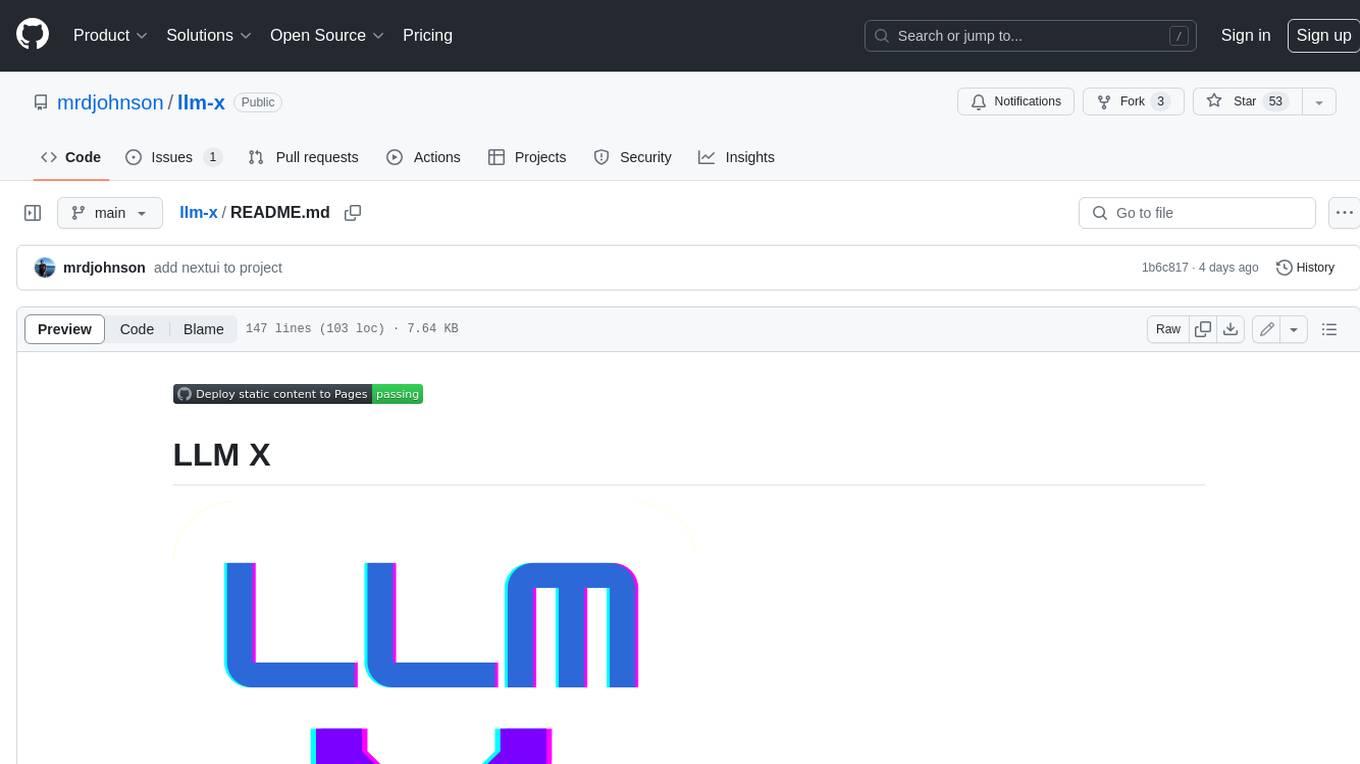
llm-x
LLM X is a ChatGPT-style UI for the niche group of folks who run Ollama (think of this like an offline chat gpt server) locally. It supports sending and receiving images and text and works offline through PWA (Progressive Web App) standards. The project utilizes React, Typescript, Lodash, Mobx State Tree, Tailwind css, DaisyUI, NextUI, Highlight.js, React Markdown, kbar, Yet Another React Lightbox, Vite, and Vite PWA plugin. It is inspired by ollama-ui's project and Perplexity.ai's UI advancements in the LLM UI space. The project is still under development, but it is already a great way to get started with building your own LLM UI.
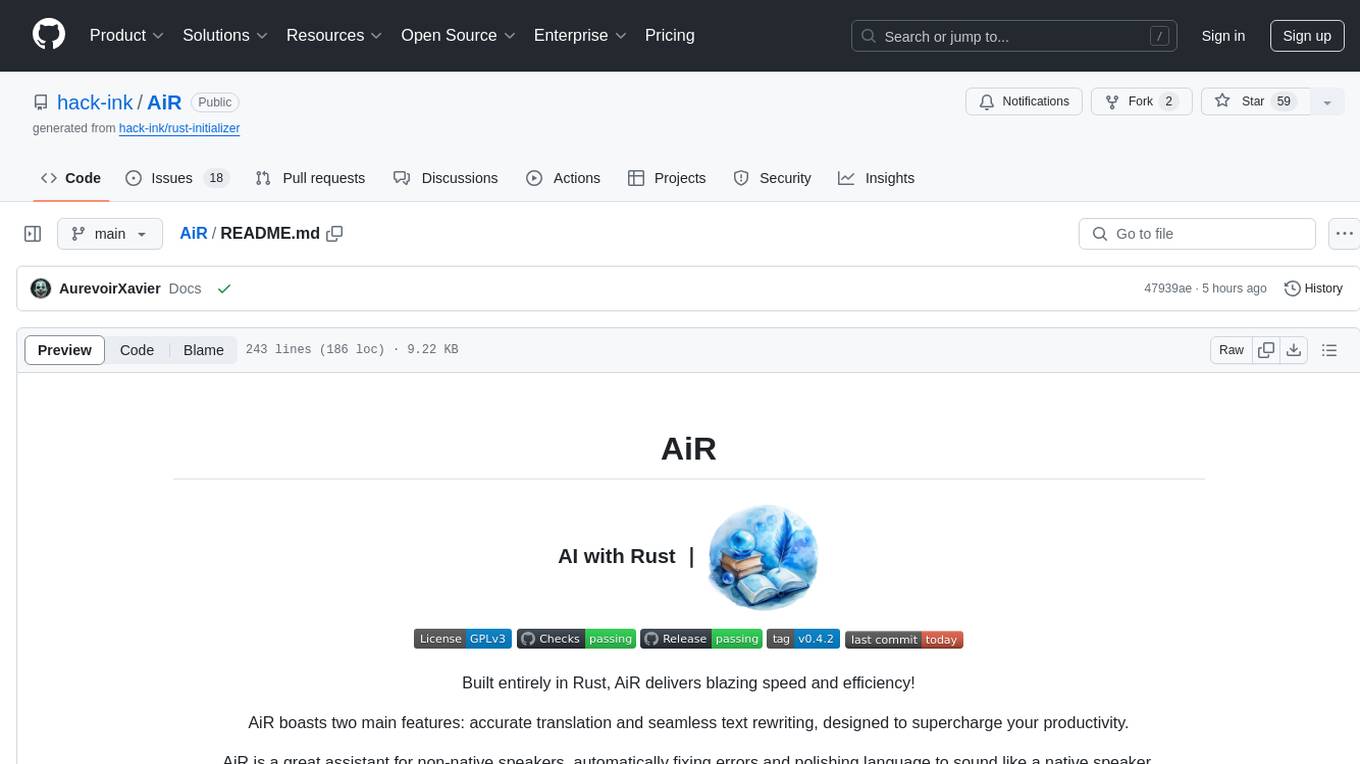
AiR
AiR is an AI tool built entirely in Rust that delivers blazing speed and efficiency. It features accurate translation and seamless text rewriting to supercharge productivity. AiR is designed to assist non-native speakers by automatically fixing errors and polishing language to sound like a native speaker. The tool is under heavy development with more features on the horizon.
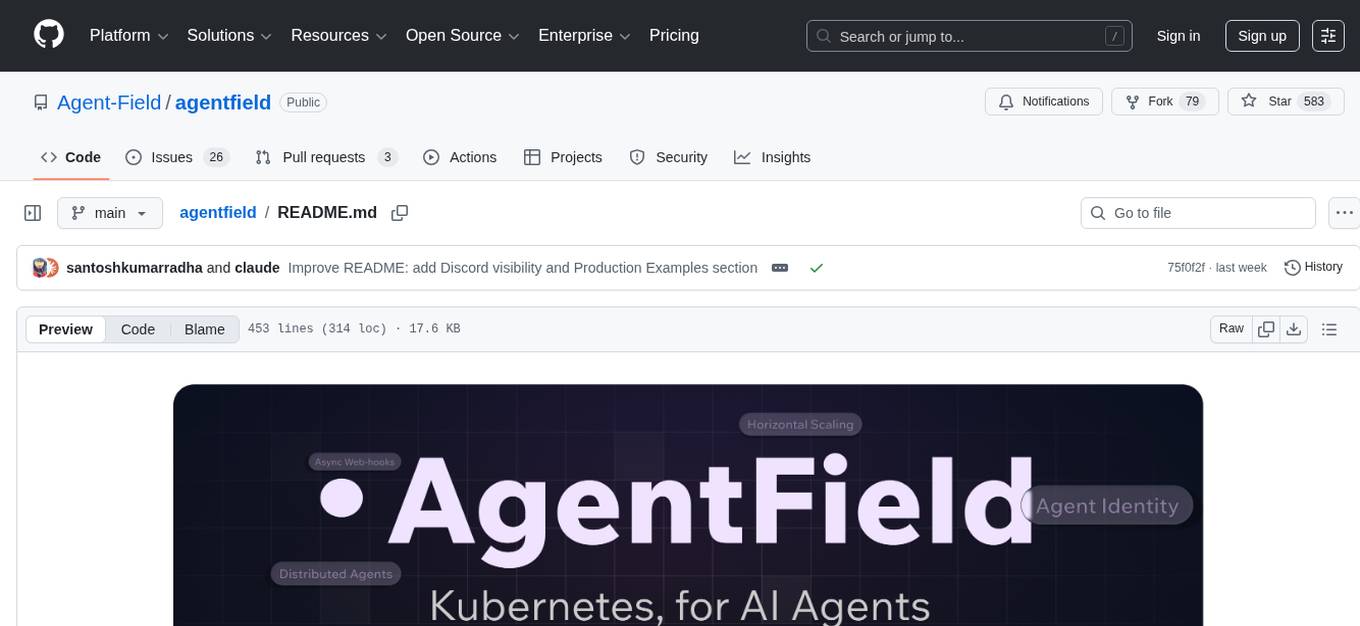
agentfield
AgentField is an open-source control plane designed for autonomous AI agents, providing infrastructure for agents to make decisions beyond chatbots. It offers features like scaling infrastructure, routing & discovery, async execution, durable state, observability, trust infrastructure with cryptographic identity, verifiable credentials, and policy enforcement. Users can write agents in Python, Go, TypeScript, or interact via REST APIs. The tool enables the creation of AI backends that reason autonomously within defined boundaries, offering predictability and flexibility. AgentField aims to bridge the gap between AI frameworks and production-ready infrastructure for AI agents.
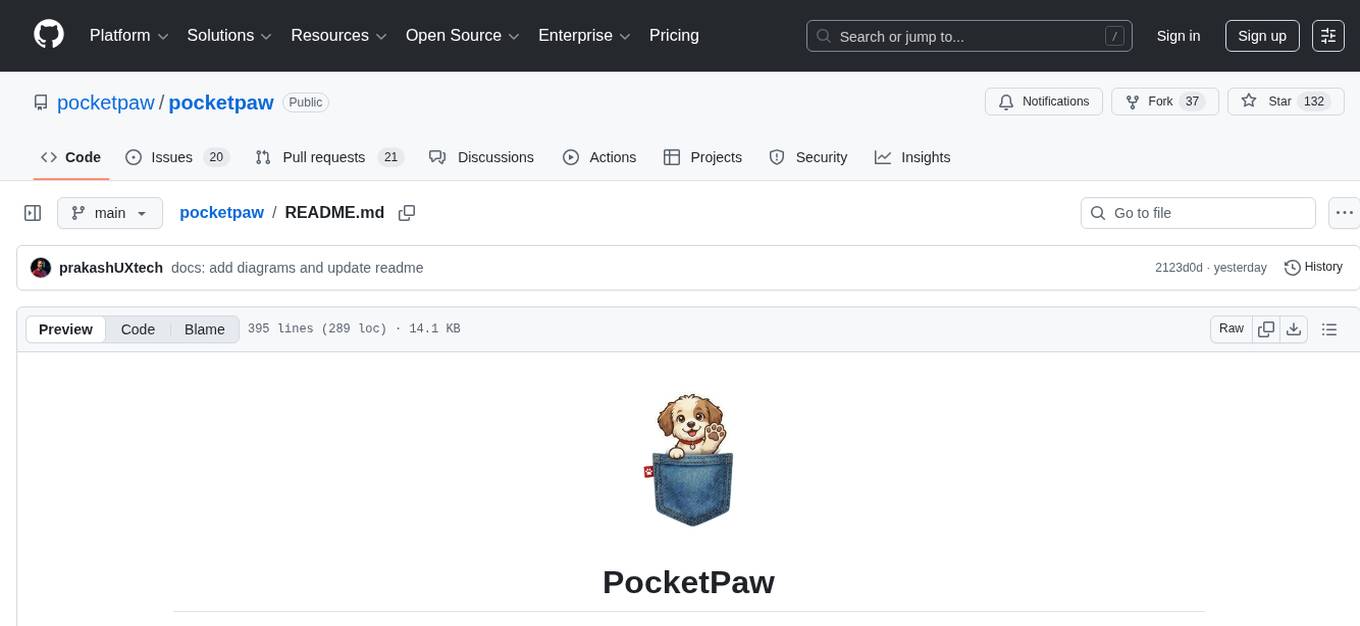
pocketpaw
PocketPaw is a lightweight and user-friendly tool designed for managing and organizing your digital assets. It provides a simple interface for users to easily categorize, tag, and search for files across different platforms. With PocketPaw, you can efficiently organize your photos, documents, and other files in a centralized location, making it easier to access and share them. Whether you are a student looking to organize your study materials, a professional managing project files, or a casual user wanting to declutter your digital space, PocketPaw is the perfect solution for all your file management needs.
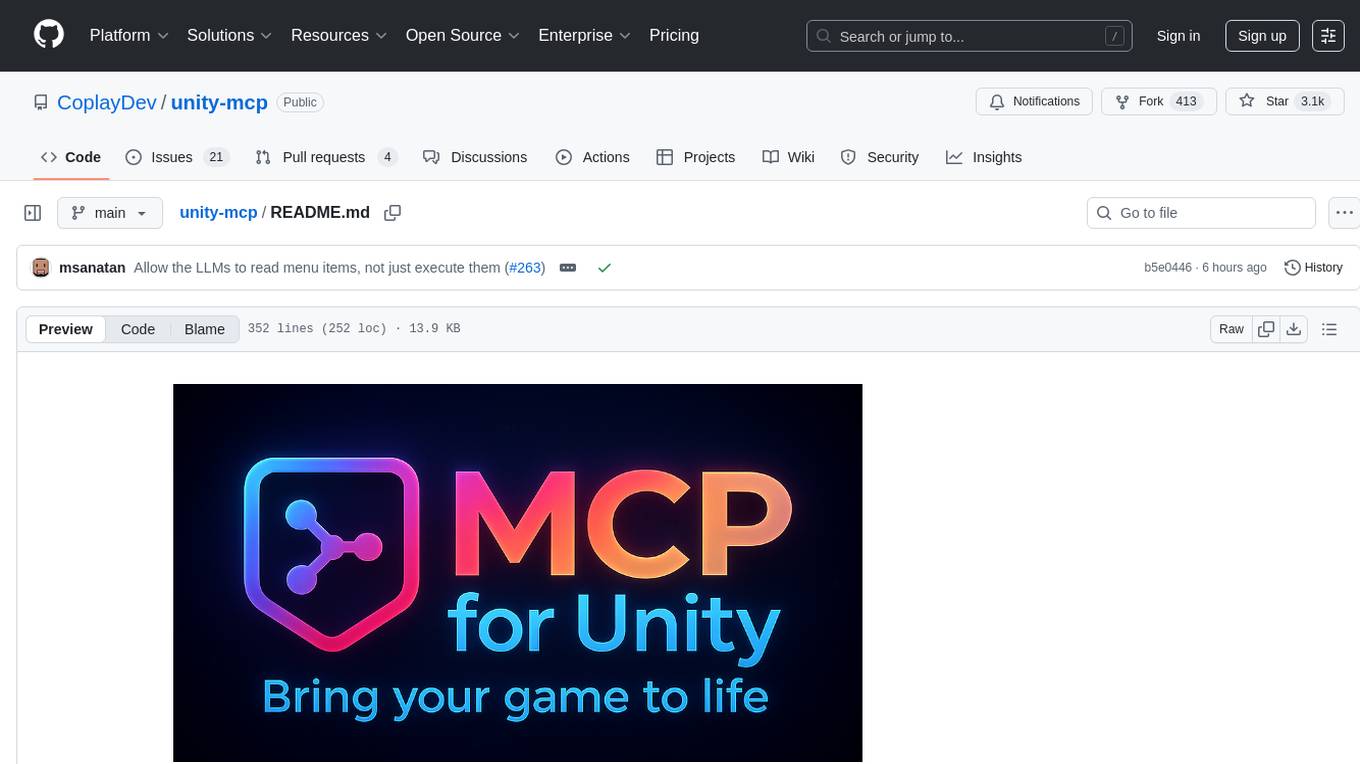
unity-mcp
MCP for Unity is a tool that acts as a bridge, enabling AI assistants to interact with the Unity Editor via a local MCP Client. Users can instruct their LLM to manage assets, scenes, scripts, and automate tasks within Unity. The tool offers natural language control, powerful tools for asset management, scene manipulation, and automation of workflows. It is extensible and designed to work with various MCP Clients, providing a range of functions for precise text edits, script management, GameObject operations, and more.

GPTSwarm
GPTSwarm is a graph-based framework for LLM-based agents that enables the creation of LLM-based agents from graphs and facilitates the customized and automatic self-organization of agent swarms with self-improvement capabilities. The library includes components for domain-specific operations, graph-related functions, LLM backend selection, memory management, and optimization algorithms to enhance agent performance and swarm efficiency. Users can quickly run predefined swarms or utilize tools like the file analyzer. GPTSwarm supports local LM inference via LM Studio, allowing users to run with a local LLM model. The framework has been accepted by ICML2024 and offers advanced features for experimentation and customization.
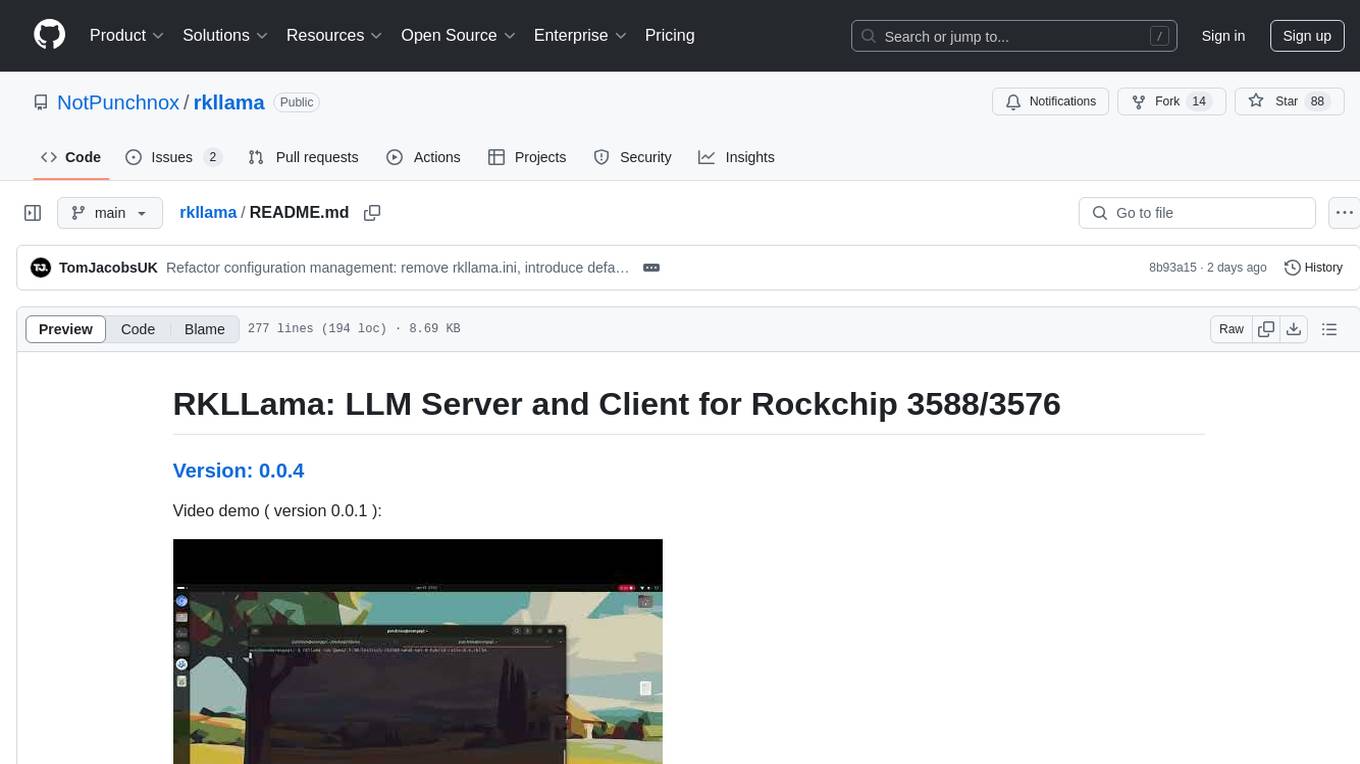
rkllama
RKLLama is a server and client tool designed for running and interacting with LLM models optimized for Rockchip RK3588(S) and RK3576 platforms. It allows models to run on the NPU, with features such as running models on NPU, partial Ollama API compatibility, pulling models from Huggingface, API REST with documentation, dynamic loading/unloading of models, inference requests with streaming modes, simplified model naming, CPU model auto-detection, and optional debug mode. The tool supports Python 3.8 to 3.12 and has been tested on Orange Pi 5 Pro and Orange Pi 5 Plus with specific OS versions.
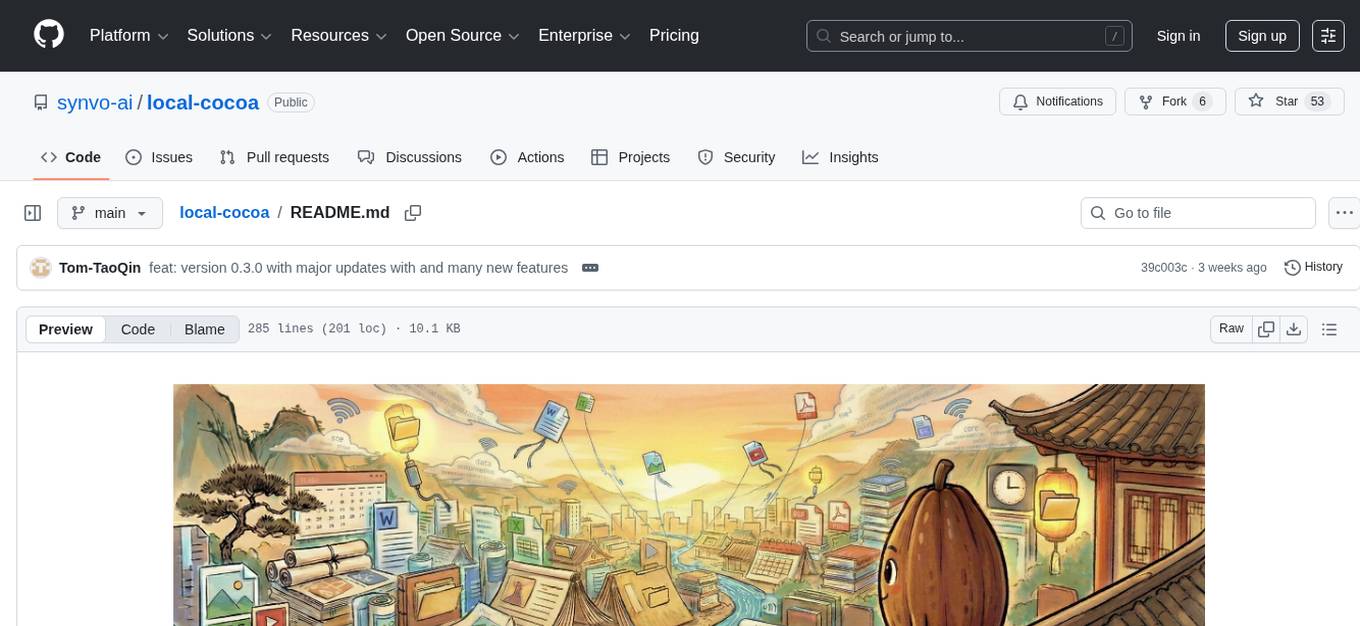
local-cocoa
Local Cocoa is a privacy-focused tool that runs entirely on your device, turning files into memory to spark insights and power actions. It offers features like fully local privacy, multimodal memory, vector-powered retrieval, intelligent indexing, vision understanding, hardware acceleration, focused user experience, integrated notes, and auto-sync. The tool combines file ingestion, intelligent chunking, and local retrieval to build a private on-device knowledge system. The ultimate goal includes more connectors like Google Drive integration, voice mode for local speech-to-text interaction, and a plugin ecosystem for community tools and agents. Local Cocoa is built using Electron, React, TypeScript, FastAPI, llama.cpp, and Qdrant.
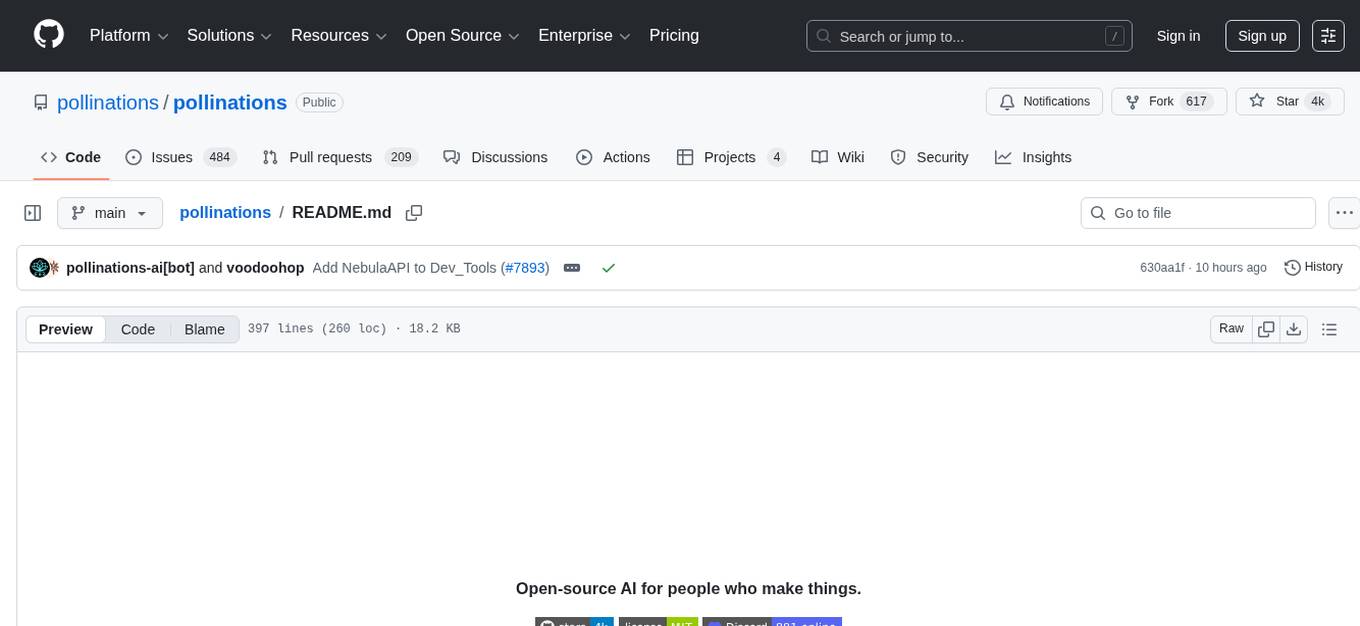
pollinations
pollinations.ai is an open-source generative AI platform based in Berlin, empowering community projects with accessible text, image, video, and audio generation APIs. It offers a unified API endpoint for various AI generation needs, including text, images, audio, and video. The platform provides features like image generation using models such as Flux, GPT Image, Seedream, and Kontext, video generation with Seedance and Veo, and audio generation with text-to-speech and speech-to-text capabilities. Users can access the platform through a web interface or API, and authentication is managed through API keys. The platform is community-driven, transparent, and ethical, aiming to make AI technology open, accessible, and interconnected while fostering innovation and responsible development.
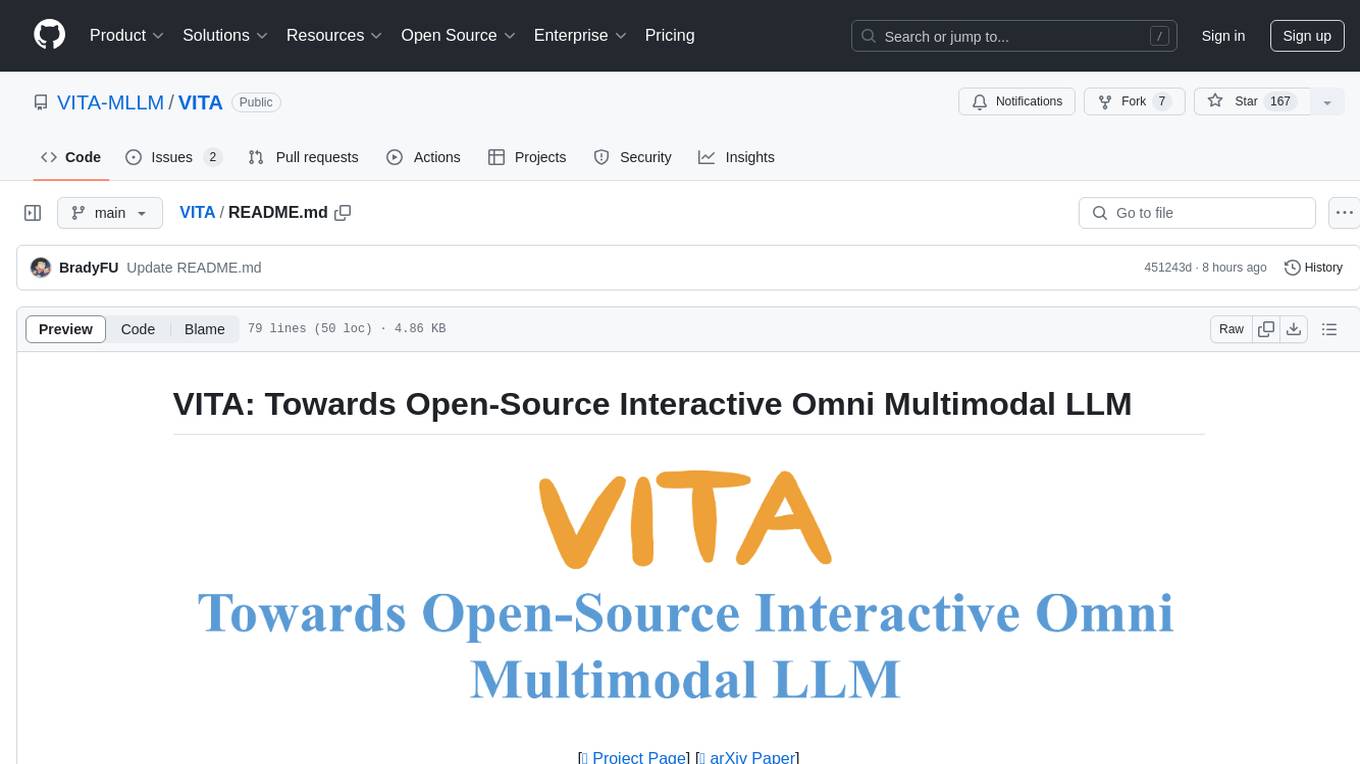
VITA
VITA is an open-source interactive omni multimodal Large Language Model (LLM) capable of processing video, image, text, and audio inputs simultaneously. It stands out with features like Omni Multimodal Understanding, Non-awakening Interaction, and Audio Interrupt Interaction. VITA can respond to user queries without a wake-up word, track and filter external queries in real-time, and handle various query inputs effectively. The model utilizes state tokens and a duplex scheme to enhance the multimodal interactive experience.
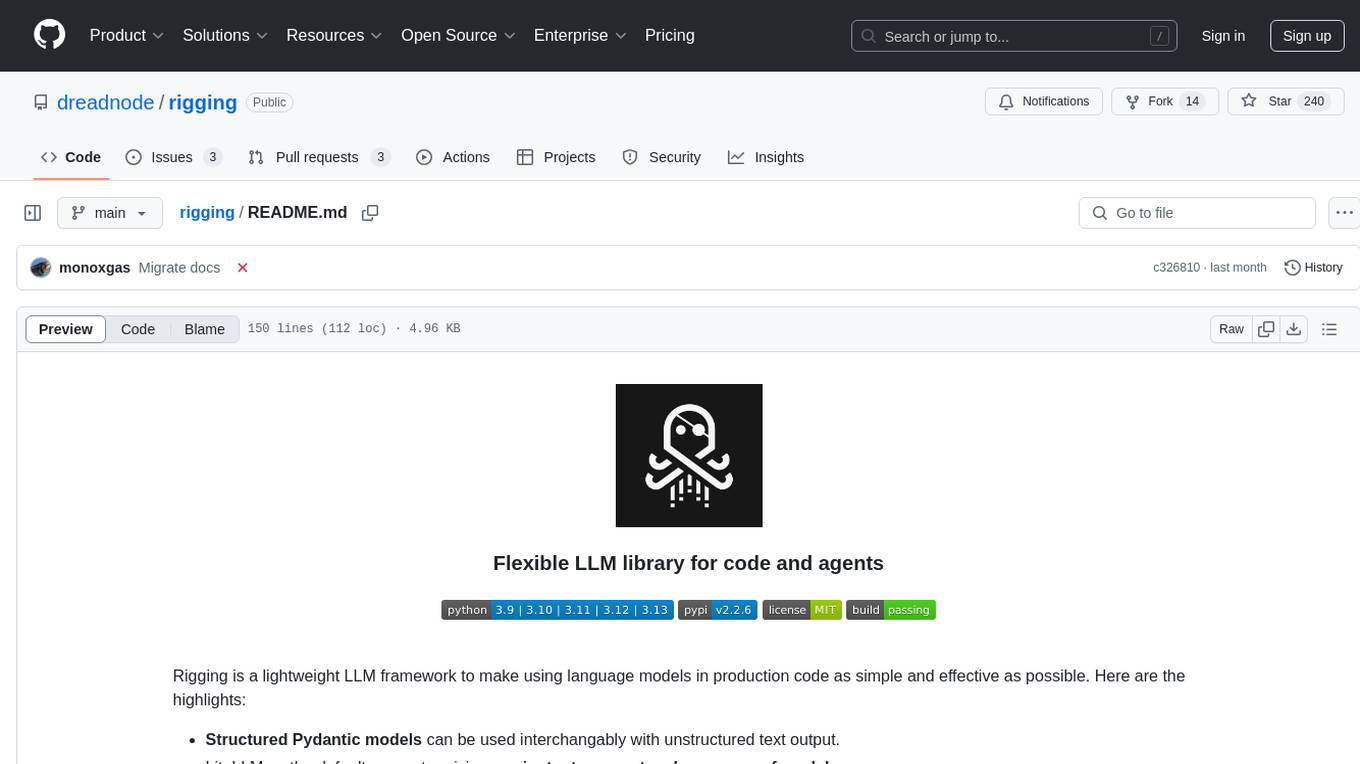
rigging
Rigging is a lightweight LLM framework designed to simplify the usage of language models in production code. It offers structured Pydantic models for text output, supports various models like LiteLLM and transformers, and provides features such as defining prompts as python functions, simple tool use, storing models as connection strings, async batching for large scale generation, and modern Python support with type hints and async capabilities. Rigging is developed by dreadnode and is suitable for tasks like building chat pipelines, running completions, tracking behavior with tracing, playing with generation parameters, and scaling up with iterating and batching.

mistral.rs
Mistral.rs is a fast LLM inference platform written in Rust. We support inference on a variety of devices, quantization, and easy-to-use application with an Open-AI API compatible HTTP server and Python bindings.
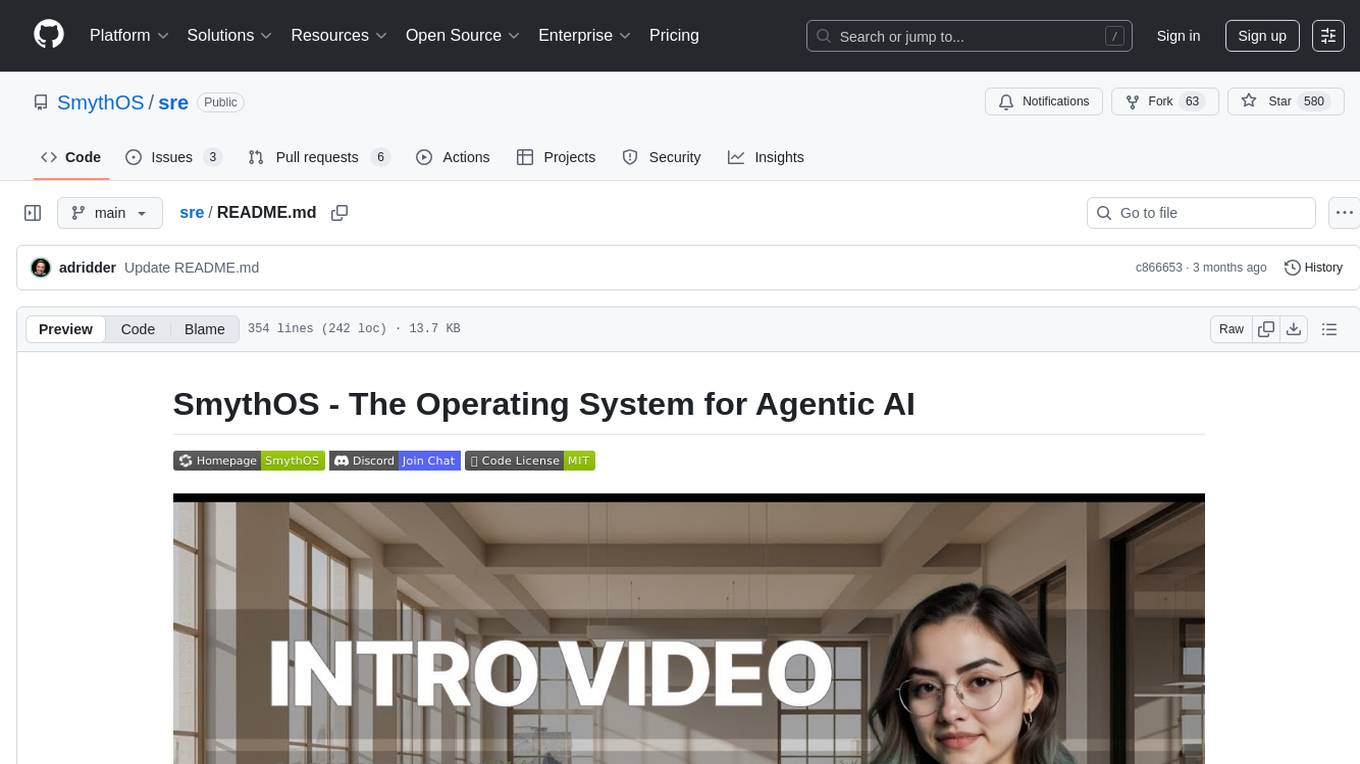
sre
SmythOS is an operating system designed for building, deploying, and managing intelligent AI agents at scale. It provides a unified SDK and resource abstraction layer for various AI services, making it easy to scale and flexible. With an agent-first design, developer-friendly SDK, modular architecture, and enterprise security features, SmythOS offers a robust foundation for AI workloads. The system is built with a philosophy inspired by traditional operating system kernels, ensuring autonomy, control, and security for AI agents. SmythOS aims to make shipping production-ready AI agents accessible and open for everyone in the coming Internet of Agents era.
For similar tasks
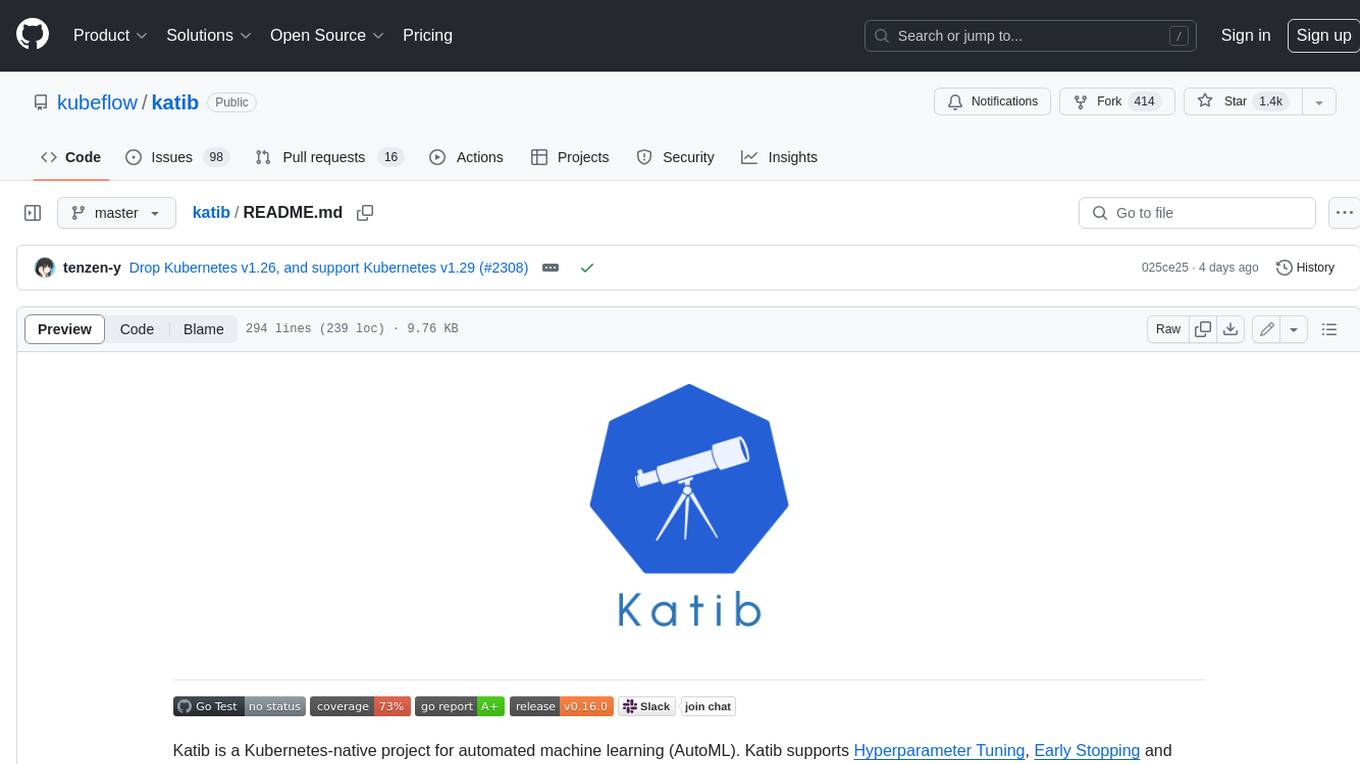
katib
Katib is a Kubernetes-native project for automated machine learning (AutoML). Katib supports Hyperparameter Tuning, Early Stopping and Neural Architecture Search. Katib is the project which is agnostic to machine learning (ML) frameworks. It can tune hyperparameters of applications written in any language of the users’ choice and natively supports many ML frameworks, such as TensorFlow, Apache MXNet, PyTorch, XGBoost, and others. Katib can perform training jobs using any Kubernetes Custom Resources with out of the box support for Kubeflow Training Operator, Argo Workflows, Tekton Pipelines and many more.

cog
Cog is an open-source tool that lets you package machine learning models in a standard, production-ready container. You can deploy your packaged model to your own infrastructure, or to Replicate.

mosec
Mosec is a high-performance and flexible model serving framework for building ML model-enabled backend and microservices. It bridges the gap between any machine learning models you just trained and the efficient online service API. * **Highly performant** : web layer and task coordination built with Rust 🦀, which offers blazing speed in addition to efficient CPU utilization powered by async I/O * **Ease of use** : user interface purely in Python 🐍, by which users can serve their models in an ML framework-agnostic manner using the same code as they do for offline testing * **Dynamic batching** : aggregate requests from different users for batched inference and distribute results back * **Pipelined stages** : spawn multiple processes for pipelined stages to handle CPU/GPU/IO mixed workloads * **Cloud friendly** : designed to run in the cloud, with the model warmup, graceful shutdown, and Prometheus monitoring metrics, easily managed by Kubernetes or any container orchestration systems * **Do one thing well** : focus on the online serving part, users can pay attention to the model optimization and business logic

web-llm
WebLLM is a modular and customizable javascript package that directly brings language model chats directly onto web browsers with hardware acceleration. Everything runs inside the browser with no server support and is accelerated with WebGPU. WebLLM is fully compatible with OpenAI API. That is, you can use the same OpenAI API on any open source models locally, with functionalities including json-mode, function-calling, streaming, etc. We can bring a lot of fun opportunities to build AI assistants for everyone and enable privacy while enjoying GPU acceleration.
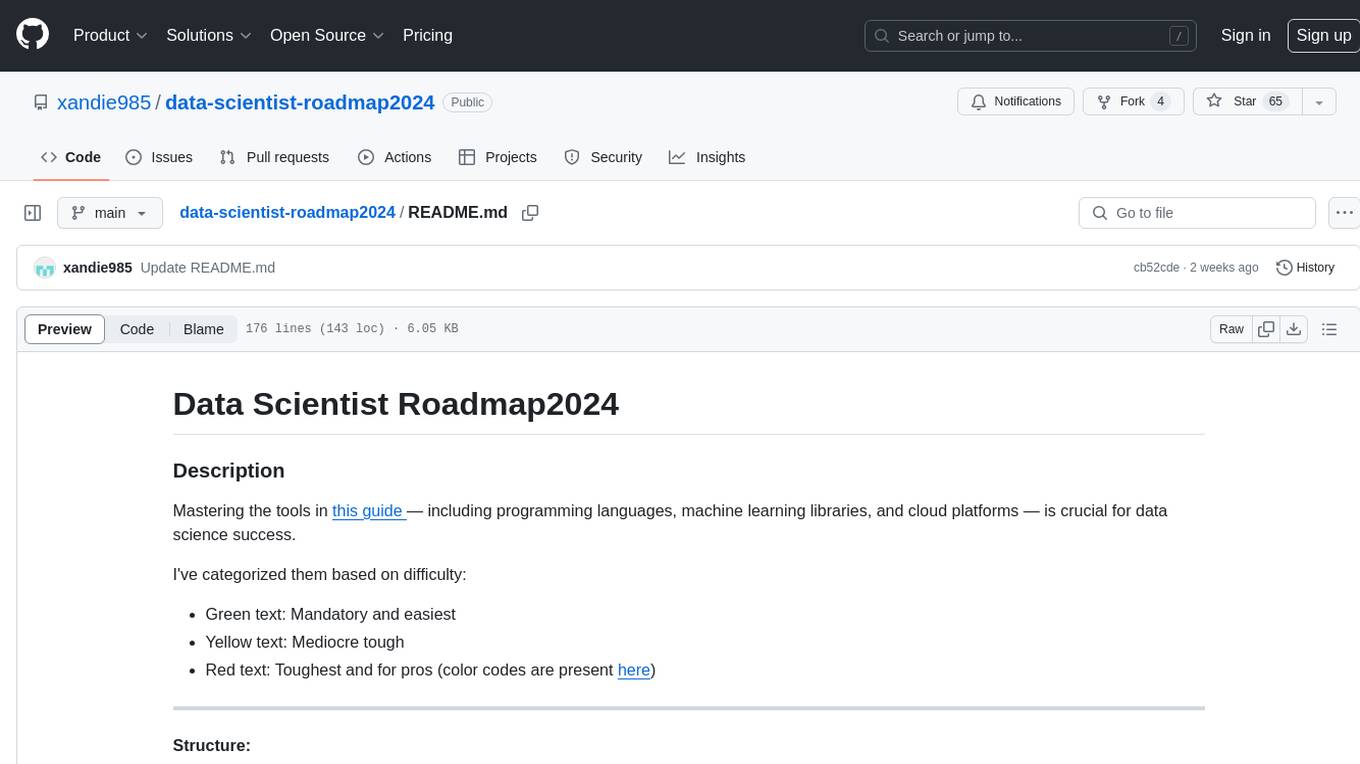
data-scientist-roadmap2024
The Data Scientist Roadmap2024 provides a comprehensive guide to mastering essential tools for data science success. It includes programming languages, machine learning libraries, cloud platforms, and concepts categorized by difficulty. The roadmap covers a wide range of topics from programming languages to machine learning techniques, data visualization tools, and DevOps/MLOps tools. It also includes web development frameworks and specific concepts like supervised and unsupervised learning, NLP, deep learning, reinforcement learning, and statistics. Additionally, it delves into DevOps tools like Airflow and MLFlow, data visualization tools like Tableau and Matplotlib, and other topics such as ETL processes, optimization algorithms, and financial modeling.
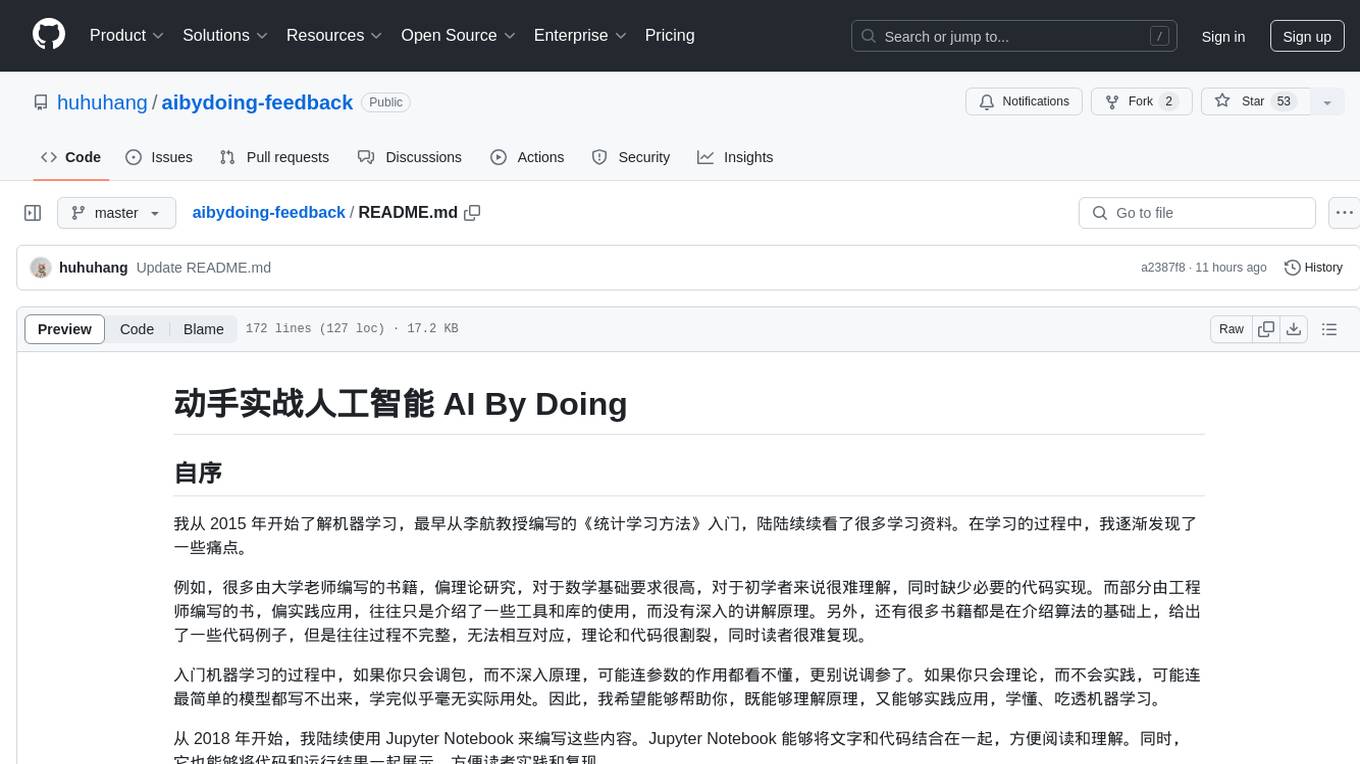
aibydoing-feedback
AI By Doing is a hands-on artificial intelligence tutorial series that aims to help beginners understand the principles of machine learning and deep learning while providing practical applications. The content covers various supervised and unsupervised learning algorithms, machine learning engineering, deep learning fundamentals, frameworks like TensorFlow and PyTorch, and applications in computer vision and natural language processing. The tutorials are written in Jupyter Notebook format, combining theory, mathematical derivations, and Python code implementations to facilitate learning and understanding.
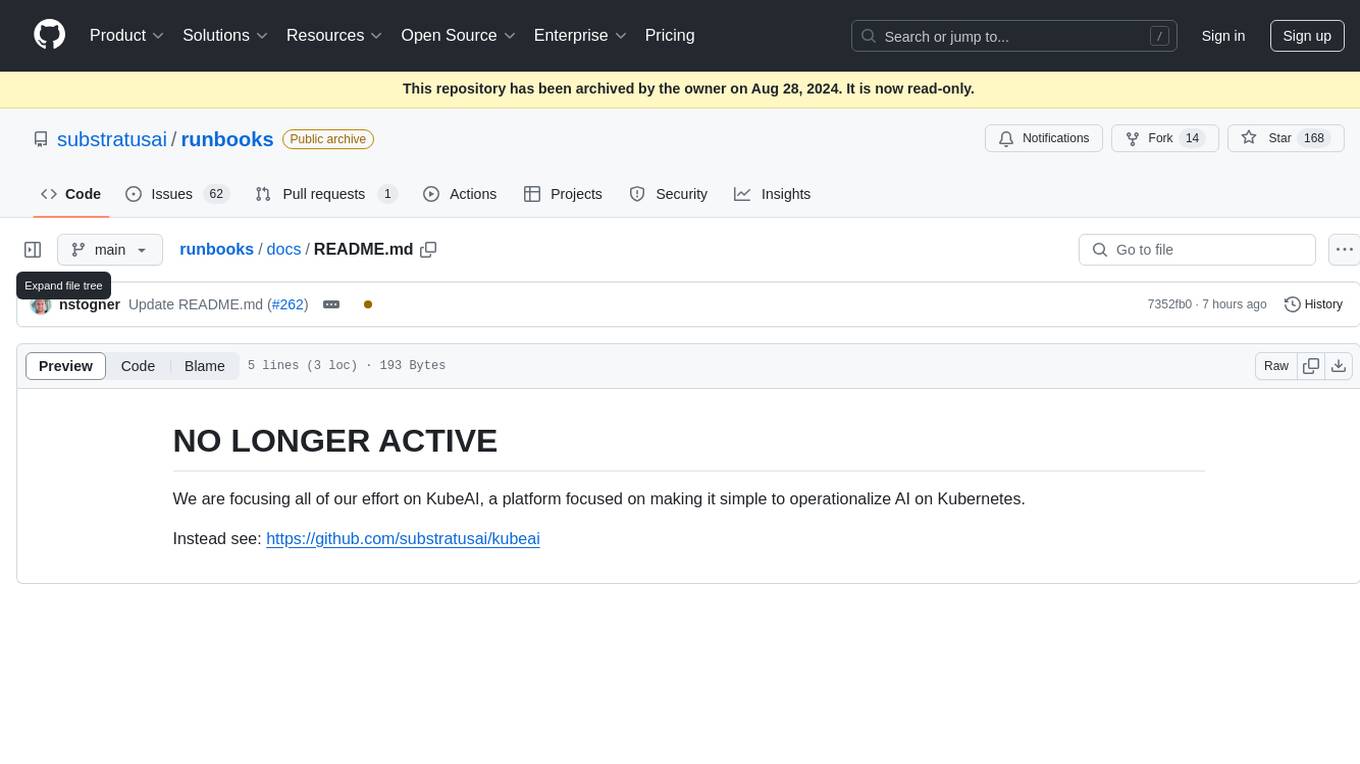
runbooks
Runbooks is a repository that is no longer active. The project has been deprecated in favor of KubeAI, a platform designed to simplify the operationalization of AI on Kubernetes. For more information, please refer to the new repository at https://github.com/substratusai/kubeai.
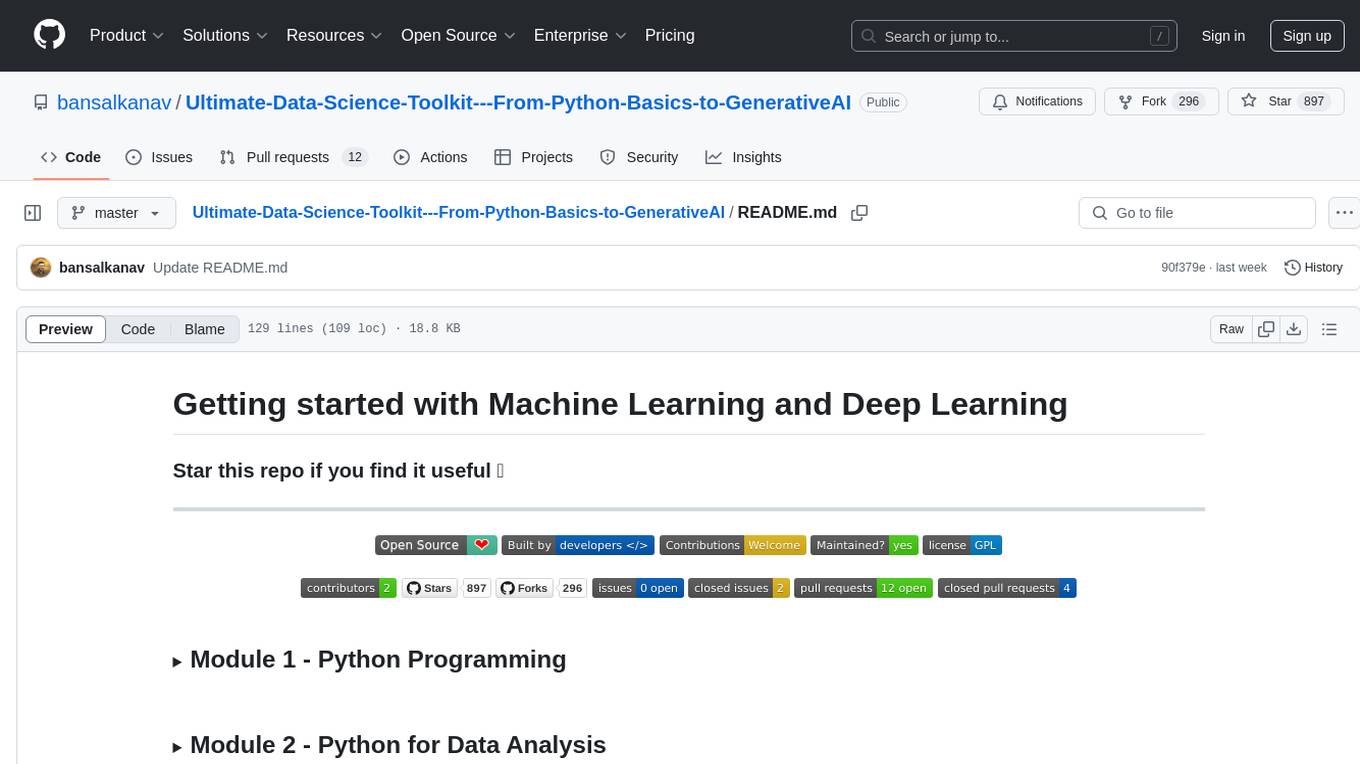
Ultimate-Data-Science-Toolkit---From-Python-Basics-to-GenerativeAI
Ultimate Data Science Toolkit is a comprehensive repository covering Python basics to Generative AI. It includes modules on Python programming, data analysis, statistics, machine learning, MLOps, case studies, and deep learning. The repository provides detailed tutorials on various topics such as Python data structures, control statements, functions, modules, object-oriented programming, exception handling, file handling, web API, databases, list comprehension, lambda functions, Pandas, Numpy, data visualization, statistical analysis, supervised and unsupervised machine learning algorithms, model serialization, ML pipeline orchestration, case studies, and deep learning concepts like neural networks and autoencoders.
For similar jobs

weave
Weave is a toolkit for developing Generative AI applications, built by Weights & Biases. With Weave, you can log and debug language model inputs, outputs, and traces; build rigorous, apples-to-apples evaluations for language model use cases; and organize all the information generated across the LLM workflow, from experimentation to evaluations to production. Weave aims to bring rigor, best-practices, and composability to the inherently experimental process of developing Generative AI software, without introducing cognitive overhead.

agentcloud
AgentCloud is an open-source platform that enables companies to build and deploy private LLM chat apps, empowering teams to securely interact with their data. It comprises three main components: Agent Backend, Webapp, and Vector Proxy. To run this project locally, clone the repository, install Docker, and start the services. The project is licensed under the GNU Affero General Public License, version 3 only. Contributions and feedback are welcome from the community.

oss-fuzz-gen
This framework generates fuzz targets for real-world `C`/`C++` projects with various Large Language Models (LLM) and benchmarks them via the `OSS-Fuzz` platform. It manages to successfully leverage LLMs to generate valid fuzz targets (which generate non-zero coverage increase) for 160 C/C++ projects. The maximum line coverage increase is 29% from the existing human-written targets.

LLMStack
LLMStack is a no-code platform for building generative AI agents, workflows, and chatbots. It allows users to connect their own data, internal tools, and GPT-powered models without any coding experience. LLMStack can be deployed to the cloud or on-premise and can be accessed via HTTP API or triggered from Slack or Discord.

VisionCraft
The VisionCraft API is a free API for using over 100 different AI models. From images to sound.

kaito
Kaito is an operator that automates the AI/ML inference model deployment in a Kubernetes cluster. It manages large model files using container images, avoids tuning deployment parameters to fit GPU hardware by providing preset configurations, auto-provisions GPU nodes based on model requirements, and hosts large model images in the public Microsoft Container Registry (MCR) if the license allows. Using Kaito, the workflow of onboarding large AI inference models in Kubernetes is largely simplified.

PyRIT
PyRIT is an open access automation framework designed to empower security professionals and ML engineers to red team foundation models and their applications. It automates AI Red Teaming tasks to allow operators to focus on more complicated and time-consuming tasks and can also identify security harms such as misuse (e.g., malware generation, jailbreaking), and privacy harms (e.g., identity theft). The goal is to allow researchers to have a baseline of how well their model and entire inference pipeline is doing against different harm categories and to be able to compare that baseline to future iterations of their model. This allows them to have empirical data on how well their model is doing today, and detect any degradation of performance based on future improvements.

Azure-Analytics-and-AI-Engagement
The Azure-Analytics-and-AI-Engagement repository provides packaged Industry Scenario DREAM Demos with ARM templates (Containing a demo web application, Power BI reports, Synapse resources, AML Notebooks etc.) that can be deployed in a customer’s subscription using the CAPE tool within a matter of few hours. Partners can also deploy DREAM Demos in their own subscriptions using DPoC.